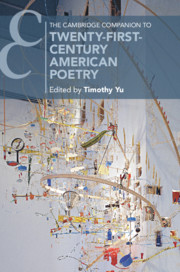Book contents
- The Cambridge Companion to Twenty-First-Century American Poetry
- The Cambridge Companion to Twenty-First-Century American Poetry
- Copyright page
- Contents
- Notes on Contributors
- Chronology
- Introduction
- 1 New Black Aesthetics: Post–Civil Rights African American Poetry
- 2 Traditions of Innovation in Asian American Poetry
- 3 Locations of Contemporary Latina/o Poetry
- 4 Sovereign Poetics and Possibilities in Indigenous Poetry
- 5 Changing Topographies, New Feminisms, and Women Poets
- 6 The Nearly Baroque in Contemporary Poetry
- 7 Disability Aesthetics and Poetic Practice
- 8 Queer Poetry and Bioethics
- 9 Trauma and the Avant-Garde
- 10 Blockade Chants and Cloud-Nets: Terminal Poetics of the Anthropocene
- 11 Give Me Poems and Give Me Death: On the End of Slam(?)
- 12 Anti-capitalist Poetry
- 13 Of Poetry and Permanent War in the Twenty-First-Century
- 14 Poetry in the Program Era
- 15 The Future of Poetry Studies
- Further Reading
- Index
- Cambridge Companions to …
- References
9 - Trauma and the Avant-Garde
Published online by Cambridge University Press: 25 February 2021
- The Cambridge Companion to Twenty-First-Century American Poetry
- The Cambridge Companion to Twenty-First-Century American Poetry
- Copyright page
- Contents
- Notes on Contributors
- Chronology
- Introduction
- 1 New Black Aesthetics: Post–Civil Rights African American Poetry
- 2 Traditions of Innovation in Asian American Poetry
- 3 Locations of Contemporary Latina/o Poetry
- 4 Sovereign Poetics and Possibilities in Indigenous Poetry
- 5 Changing Topographies, New Feminisms, and Women Poets
- 6 The Nearly Baroque in Contemporary Poetry
- 7 Disability Aesthetics and Poetic Practice
- 8 Queer Poetry and Bioethics
- 9 Trauma and the Avant-Garde
- 10 Blockade Chants and Cloud-Nets: Terminal Poetics of the Anthropocene
- 11 Give Me Poems and Give Me Death: On the End of Slam(?)
- 12 Anti-capitalist Poetry
- 13 Of Poetry and Permanent War in the Twenty-First-Century
- 14 Poetry in the Program Era
- 15 The Future of Poetry Studies
- Further Reading
- Index
- Cambridge Companions to …
- References
Summary
In twentieth-century US poetry, we can recognize avant-garde work for its disavowal of historic forms and genres, inclusion of nonliterary texts and materials, and centering proceduralism over craft. As we move into the twenty-first century, we can see how these practices have helped bring to light artists from marginalized communities who use these strategies to address the historic traumas and ongoing harms their people experience. However, such work has illuminated deep tensions within contemporary writing communities regarding how avant-garde practices and practitioners are received. This chapter begins with a brief study of a series of events that broke out between 2013 and 2015 around Kenneth Goldsmith’s work, in which the tensions between avant-garde practices, cultural trauma, and appropriate authorship spilled into public view. Next, it examines Douglas Kearney's and Dawn Lundy Martin’s work in the context of black pain and the excess of black signification. It closes with a discussion of how South Asian diaspora writers Bhanu Kapil and Divya Victor inventively appropriate and redefine whiteness through a process of “compositional witness.”
- Type
- Chapter
- Information
- The Cambridge Companion to Twenty-First-Century American Poetry , pp. 132 - 146Publisher: Cambridge University PressPrint publication year: 2021
References
Works Cited
- 1
- Cited by

